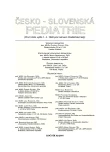Effect of Toll-like Receptor 4 and Antimicrobial Peptide Cathelicidin on Clinical Course of Infections in Urinary Pathways Caused by Uropathogenic Strains of Escherichia coli
Vplyv Toll-like receptoru 4 a antimikróbneho peptidu katelicidínu na klinický priebeh infekcie močových ciest spôsobených uropatogénnymi kmeňmi Escherichia coli
Infekcie močových ciest (UTI) patria medzi najčastejšie infekcie, ktoré sa výraznou mierou podieľajú na chorobnosti obyvateľstva. Pôvodcami UTI sú najmä uropatogénne kmene Escherichia coli (UPEC), ktoré sa detekujú vo viac ako 80 % prípadov. Priebeh týchto infekcií nezávisí iba od patogéna (napr. UPEC), ale riziko UTI je determinované aj schopnosťou hostiteľa rozpoznať patogén a iniciovať aktiváciu obranných mechanizmov. Patogén sa dostáva do bezmikróbneho prostredia, v ktorom môže spôsobiť akútne, potenciálne život-ohrozujúce infekcie. Následkom môže byť prechod do chronicity. Štúdie na zvieracích modeloch UTI identifikovali molekulárne mechanizmy, ktoré spúšťajú atak slizničných patogénov a vrodenú imunitnú odpoveď hostiteľa. Na základe týchto interakcií sa začína odkrývať genetický mechanizmus vnímavosti na dané ochorenie. Významná rozpoznávacia a aktivačná funkcia je pripisovaná nedávno objaveným Toll-like receptorom a katelicidínu. Ich detekcia na molekulárno-biologickej úrovni pomôže pochopiť ich funkcie a vplyv na UTI, zároveň to môže byť cesta k objaveniu nových cieľových molekúl zodpovedných za infekčný proces.
Kľúčové slová:
infekcie močových ciest, uropatogénne E. coli, katelicidín, Toll-like receptor 4
Authors:
A. Liptáková 1; Ľ. Podracká 2; L. Siegfried 1
Authors‘ workplace:
Ústav lekárskej mikrobiológie a klinickej mikrobiológie LF UPJŠ a FNLP, Košice
riaditeľ prof. MUDr. L. Siegfried, PhD.
1; 1. Klinika pre deti a dorast LF UPJŠ, Košice
prednostka prof. MUDr. Ľ. Podracká, CSc.
2
Published in:
Čes-slov Pediat 2007; 62 (3): 152-157.
Category:
Review
Overview
Urinary tract infections (UTI) are among the most common infections increasing overall morbidity. Uropathogenic Escherichia coli (UPEC) are the causative organisms in more than 80% of cases. The clinical course of UTI depends not solely on the pathogen (e.g. UPEC), moreover it also depends on the ability of host to recognise pathogen and initiate activation of defence mechanisms. The pathogen is introduced to microbially- naive environment therefore it can cause acute, potentially life-threatening infections. Chronic disease could be the next step. The animal UTI studies identified molecular mechanisms that initiate tissue attack by mucosal pathogens and triggering the innate host response. On the basis of these mechanisms the genetics of disease susceptibility are beginning to be understood.
Important recognition and activation function was recently described for Toll-like receptor family and cathelicidin. Their detection based on molecular methods will help to understand their precise functions and their influence on UTI, and consequently it can be the way to discover new target molecules responsible for pathogenesis of infection.
Key words:
urinary tract infections, uropathogenic Escherichia coli, Toll-like receptor 4, cathelicidin
Labels
Neonatology Paediatrics General practitioner for children and adolescentsArticle was published in
Czech-Slovak Pediatrics

2007 Issue 3
- What Effect Can Be Expected from Limosilactobacillus reuteri in Mucositis and Peri-Implantitis?
- The Importance of Limosilactobacillus reuteri in Administration to Diabetics with Gingivitis
Most read in this issue
- Effects of Short-term and Long-term Usage of Cannabinoids
- Antiepileptic Drugs and Lactation
- Hereditary Melanoma Resulting from Mutation in the Tumour Suppressor Gene NBS1
- The Use of Growth Models for Construction of Velocity Curves of Somatic Characteristics Based on Data of Semilongitudinal Study
